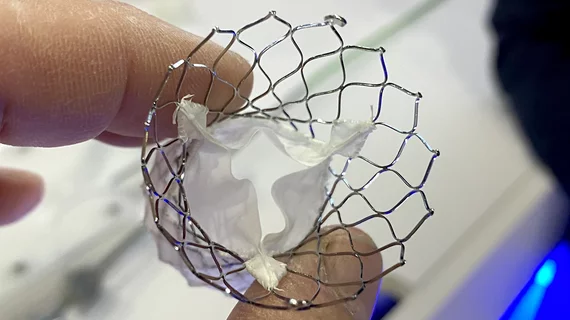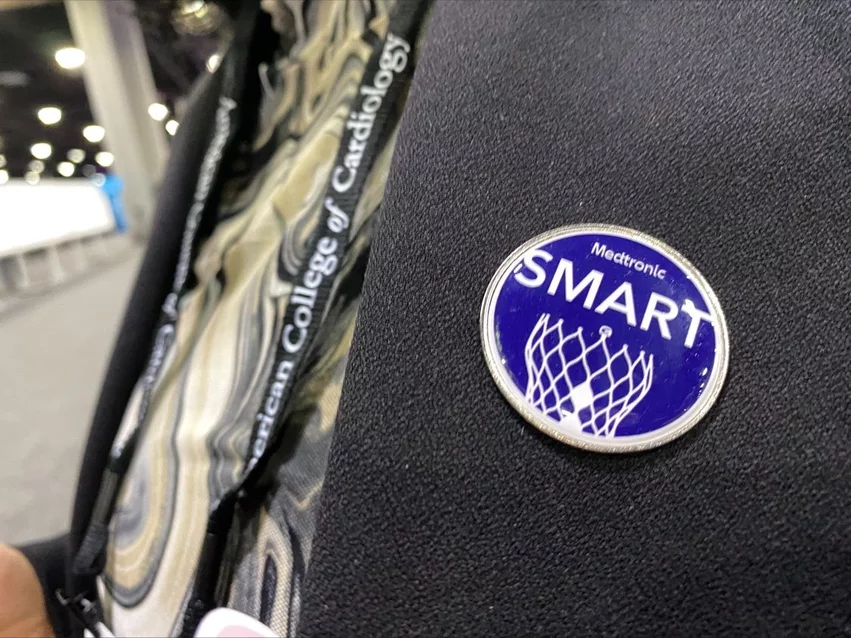Medtronic TAVR valves at heart of multiple sessions during New York cardiology conference
A new cardiology conference from the Cardiovascular Research Foundation, New York Valves: The Structural Heart Summit, premiered in New York City, and Medtronic’s transcatheter aortic valve replacement (TAVR) technology was in the spotlight for much of the three-day event.
Nina Goodheart, senior vice president and president of Medtronic’s structural heart and aortic business, said the data shared during New York Valves show highlight the consistently strong performance of the company’s CoreValve and Evolut TAVR valves.
“We know how important valve performance and durability are when clinicians are seeking a TAVR product that is not only safe, but also reduces the risk of rehospitalization and mortality,” Goodhea said in a statement highlighting the conference. “We believe the intentional and innovative design of the Evolut transcatheter aortic valve platform enables the excellent and consistent clinical evidence demonstrated in randomized clinical trials. The quality of our design and the valve performance set Evolut apart from other transcatheter aortic valves in the market.”
An updated look at one-year SMART data
One late-breaking clinical trial at the conference focused on additional one-year data from the SMART trial, which included more than 700 patients with a small aortic annulus who received either a self-expanding Evolut TAVR valve from Medtronic or a balloon-expandable Sapien 3 valve from Edwards Lifesciences. Initial SMART findings were presented at ACC.24, the annual meeting of the American College of Cardiology, back in April. Medtronic celebrated the results, emphasizing that its self-expanding valves were linked to superior hemodynamic data and a lower rate of moderate or severe prosthesis-patient mismatch (PPM) compared to balloon-expandable Sapien 3 valves. However, SMART did not identify any significant differences in patient outcomes between the two valve types after one year; it remains unclear if the differences identified by Medtronic will translate to improved long-term outcomes.
The new SMART findings presented at New York Valves focused on identifying potential predictors of TAVR outcomes among women and patients with small annuli.
Lead investigator Howard C. Herrmann, MD, a professor at the Perelman School of Medicine at the University of Pennsylvania and section chief for interventional cardiology at the Hospital of the University of Pennsylvania, presented the new findings on Wednesday, June 5. Herrmann noted that self-expanding valves were identified with less bioprosthetic valve dysfunction (BVD) than the balloon-expandable valves for all patients after one year. Also, he added, the self-expanding valves were found to be noninferior to the balloon-expandable valves when examining a composite outcome of all-cause mortality, disabling stroke or heart failure rehospitalization.
“In our analysis, the clearest predictor of valve performance was valve type,” Herrmann said in the Medtronic statement. “In addition, we demonstrated that the supra-annular self-expanding valve had superior valve performance across the entire range of annular areas included in the trial. The findings from the SMART Trial further emphasize the importance of considering valve function when making clinical decisions, especially when looking at specific patient populations like women, who may require more customized approaches.”
Five-year valve performance: TAVR vs. surgery
Another late-breaking clinical trial at New York Valves looked at long-term valve performance after TAVR and surgical aortic valve replacement (SAVR). Data from more than 5,000 patients were included in the team’s analysis. All the patients presented with severe aortic stenosis and were either treated with a Medtronic TAVR valve or surgery.
Overall, the late-breaking study found that BVD rates were lower for TAVR patients than those treated with surgery after five years. This included patients with and without a small aortic annulus.
Steven J. Yakubov, MD, a cardiologist with Riverside Methodist at Ohio Health, presented the five-year data on Friday, June 11.
“This new data demonstrates that the CoreValve/Evolut platform is the first and only TAVR platform to demonstrate a performance and durability benefit over surgery at five years in randomized controlled trials,” Yakubov said in the same statement. “This is clinically significant as poor valve performance, regardless of therapy, can result in worse patient outcomes. Further, this reinforces the importance of valve selection for patients with intermediate or greater surgical risk to potentially improve long-term outcomes.”
Supra-annular valves effective in patients with small annuli
Yet another study presented at the conference compared patient outcomes when TAVR patients with a small annulus were treated with different kinds of self-expanding valves.
On Friday, June 11, Michel Pompeu Sá, MD, MSc, a cardiothoracic surgeon with the UPMC Heart and Vascular Institute, presented findings based on 86 pairs of TAVR patients. Each pair included one patient who received a supra-annular TAVR valve from Medtronic and another patient who received a Portico/Navitor TAVR valve from Abbott.
Overall Sá et al. found that both TAVR platforms “showed equivalent clinical and hemodynamic outcomes” in terms of post-TAVR mortality and stroke in addition to transvalvular gradients hemodynamic structural valve dysfunction and nonstructural valve dysfunction. Significant paravalvular leak (PVL) was rare, the group added, and severe PVL was not identified in a single patient.
“These results should be seen as a springboard for a more comprehensive understanding of TAVR in patients with small aortic annuli, guiding future research and patient management strategies in real-world scenarios,” the authors concluded.
The team’s full analysis was published in Structural Heart.[1]


